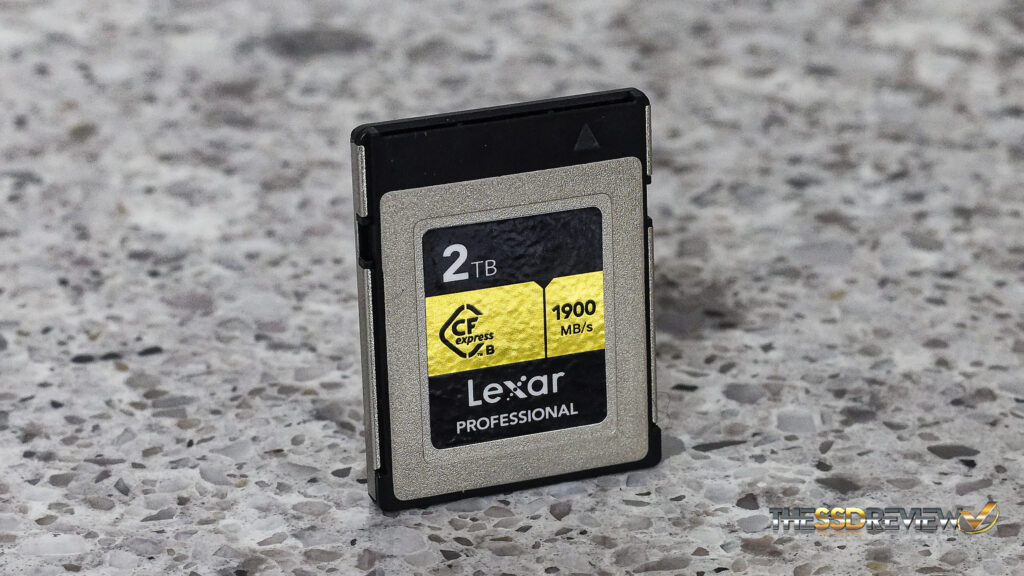Several weeks ago, Lexar sent us their biggest and brightest 2TB Lexar Professional Gold CFExpress B Card and, well, it has found a permanent home in my Canon EOS R5 mirrorless digital full frame. That wasn’t an easy feat considering I had relied solely on the ProGrade Cobalt 650GB card since its release 2 1/2 years ago, but this Lexar Gold has truly earned its wings. We are heading out to Panama, our first trip away since pre-COVID in fact, and you can trust that Lexar Gold will be accompanying us on this trip. Actually, since this report is under embargo until next week, I will be sitting beachside in the hot sun when this report is released. Enjoy!
Lexar Professional Gold CFExpress Type B Memory cards are available in capacities of 64GB – 2TB and we have reviewed a few other capacities, along with the card reader used in this report, prior. This new release of the 2TB version is rather special as so many digital media professionals are looking for just this in higher resolution photos and 8K+ recordings. In fact, the latest firmware update for the R5 includes a brand new super high resolution bumping the standard 45 megapixel shot to an unheard of 400 megapixels which validates the need for larger capacity cards such as this.
The Lexar Professional Gold 2TB memory card is the highest capacity CFExpress Type B memory card available today. It is PCIe 3.0 x 2 (2 lanes), uses the NVMe 1.4 protocol, fully backwards compatible to XQD, and is one of the only cards available that comes with a limited lifetime warranty. Performance is listed at 1900MB/s read and 1500MB/s write with a 1300MB/s sustained write performance guaranteed. This card is not listed as being VPG400 (sustained write 400MB/s) compliant which is a bit odd as it surpasses that by 4x in our testing. Checking Amazon, we can see that the 2TB Lexar Professional GOLD card is priced at $729.
TSSDR TEST BENCH AND PROTOCOL
SSD testing at TSSDR differs slightly, depending on whether we are looking at consumer or enterprise storage media. For our Lexar Professional GOLD 2TB CFExpress B Memory Card testing today, our goal is to test in a system that has been optimized with our SSD Optimization Guide.
For this Test Bench, there are no bios performance tweaks whatsoever and the new ASUS Maximus Z790 Hero brought us to over 6GHz while the newest Kingston Renegade Fury DDR-5 memory rests comfortably at 7200MHz.
The components of this Test Bench are detailed below. All hardware is linked for purchase and product sales may be reached by a simple click on the individual item.
INTEL Z790 PCIE 5.0 COMPONENTS
| PC CHASSIS: | Corsair 5000D RGB White Tempered Glass Chassis |
| MOTHERBOARD: | ASUS ROG Maximus Z790 Hero Gen 5 |
| CPU: | Intel 13th Gen Core i9-13900K |
| CPU COOLER: | Corsair Hydro Series H150i Capellix White |
| POWER SUPPLY: | Corsair HX1000i Platinum Modular 80Plus |
| GRAPHICS: | ZOTAC GeForce RTX 3080 Trinity White |
| MEMORY: | Kingston Renegade Fury RGB DDR5-7200 32GB |
| STORAGE: | Sabrent Rocket 4 Plus Gen 4 4TB NVMe SSD |
| KEYBOARD: | Corsair K70 PRO RGB Optical Mechanical Gaming |
| MOUSE: | Corsair M65 RGB Elite FPS Gaming |
| MONITOR: | Samsung 34? 1440p WQHD Ultrawide Gaming |
BENCHMARK SOFTWARE
The software in use for today’s analysis is typical of many of our reviews and consists of Crystal Disk Info, ATTO Disk Benchmark, Crystal Disk Mark, Anvil’s Storage Utilities, AJA, TxBench, as well as Sustained Disk Transfer, Temperature and True Data Transfer Rate Testing. Our selection of software allows each to build on the last and to provide validation to results already obtained.
For our testing today, we will be relying on the pictured PCIe 3.0 x4 CFExpress reader created for us by Lexar some time ago. As a bit of confirmation, we always test with multiple readers we have on hand and of both the ThunderBolt 3/4 and the newer USB 3.2 2×2 spec. One of those readers is Lexar’s own CFExpress USB 3.2 2×2 Card Reader which is a 20Gbps device that allows data transfer speeds up to the industry standard and to a theoretical max of 2GB/s. It is available and found at Amazon for $77.99.
There shouldn’t be a difference in any of these devices as the top speed of CFExpress is well below the threshold of all readers ( and our AIC Gen 3 reader), whether they be Thunderbolt 3/4 with a threshold of 2.8GB/s or USB 3.2 2×2 with a top speed of 2GB/s.
 The SSD Review The Worlds Dedicated SSD Education and Review Resource |
The SSD Review The Worlds Dedicated SSD Education and Review Resource | 


Would be interesting to do a larger write test to see if it is simply an MLC/TLC/QLC buffer issue?
Like all of your performance is within the range of common SLC cache sizes, but what happens at 300GB+ of sustained writes?
Modern 2TB SSDs tend to have ~200+GB of SLC caching before performance tanks severely.